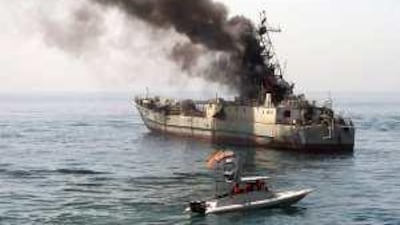Iran signalled yesterday that it would reconsider a deal to defuse the increasingly tense stand-off over its nuclear programme - while simultaneously demonstrating its military capabilities with new war games in the Arabian Gulf. The contrasting messages were typical of an opaque regime, torn by internal dissent, that is both paranoid and defiant, analysts said. Mahmoud Ahmadinejad, the Iranian president, agreed "in principle" to Brazilian mediation to resurrect an eight-month-old, United Nations-brokered uranium swap accord, his website said.
Further "technical details" are to be discussed when Brazil's president, Luiz Inácio Lula da Silva, visits Tehran on May 15, Iranian media reported. A sceptical West, however, will suspect that Tehran's renewed interest in the stalled deal is an attempt to split the UN Security Council, where the United States, Britain and France are pressing for a fourth set of sanctions against Iran, experts said.
Meir Javedanfar, an Iranian-born analyst based in Israel and co-author of The Nuclear Sphinx of Tehran, said: "It's organised chaos, a smokescreen to keep the Americans guessing what Iran's going to do.By involving the Brazilians, they're trying to push away the prospect of sanctions." Mr Ahmadinejad's purportedly new interest in a nuclear compromise follows his acrimonious exchange of insults with the US at Monday's opening of the nuclear Non-Proliferation Treaty (NPT) conference in New York.
Such public bluster was expected, however. What happened behind the scenes of the month-long global gathering would be more important, analysts said. Under October's nuclear fuel swap accord - initially accepted and then rejected by Iran - Tehran would send the bulk of its low-enriched uranium stockpile to Russia and France for further refinement into fuel rods that Tehran says it needs urgently for a medical research reactor.
The deal is essentially a confidence-building measure that would delay by several months Tehran's potential to build a nuclear bomb, nuclear analysts have said. The accord broke down when Iran insisted that the swap took place on its territory and only in small, phased amounts. The key to a breakthrough is whether Iran agrees to the fuel exchange taking place in a third country, such as Brazil or Turkey. Both oppose new sanctions against Iran, are non-permanent members of the UN Security Council, and have good relations with Tehran and Washington.
"Iran is going for the biggest player in the Islamic world, which is Turkey, and the biggest economy in Latin America, which is Brazil," Mr Javedanfar said in an interview. Barack Obama, the US president, would "be in trouble" if he rejected a deal that required Iran to export 75 per cent of its low-enriched uranium to Brazil, where it would be monitored by nuclear inspectors, Mr Javedanfar said. The West suspects Iran's nuclear programme is aimed at creating weapons, while Tehran insists it is designed only to produce clean energy, enabling it to conserve its oil deposits for export.
The tentative diplomacy is taking place against the backdrop of Iran's second display of muscle-flexing in less than a month in the Arabian Gulf. The war games, due to last eight days, are being conducted by the regular Iranian navy to demonstrate Iran's "defensive and deterrent" power to the country's "enemies", military commanders said. The manoeuvres come days after Iran's Revolutionary Guard staged similar exercises in the Strait of Hormuz - through which about 40 per cent of the world's traded oil and gas leaves the Gulf region.
Iranian officials repeatedly have made clear that the message behind such war games is that Iran would choke off the narrow bottleneck if attacked by the US or Israel. Most analysts, however, played down the significance of Iran's latest show of military bravado. Richard Dalton, Britain's former ambassador to Tehran, said: "There's some political signalling involved ? about national strength and preparedness and ability to retaliate, but then one hears such things in all their speeches."
Scott Lucas, a professor of American Studies at Birmingham University in the UK, agreed. "I don't think the Americans are going to take this as anything more than a posture." But it was unclear whether such posturing was aimed at an external or domestic audience, he said. The Iranian regime is bracing for June's first anniversary of Mr Ahmadinejad's disputed re-election. After a subdued profile since February, Iran's opposition's figureheads have in recent weeks become more defiantly outspoken than ever.
The war games help the regime to "stoke up the idea that all of Iran's problems are due to foreign instigation rather than an internal issue", Professor Lucas said. "At the same time, it projects the notion of strength to their own people." @Email:mtheodoulou@thenational.ae
